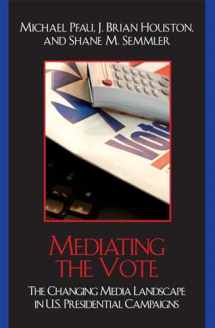
Mediating the Vote: The Changing Media Landscape in U.S. Presidential Campaigns (Communication, Media, and Politics)
Book details
Summary
Description
A sea change is taking place in how people use media, and it affects not only how people perceive political candidates and where they get their information, but also―more broadly―their basic democratic values. Mediating the Vote systematically explores a number of questions about media use and its relation to democratic engagement, analyzing the effects of communication forms on the 2004 presidential elections. Are Democratic and Republican voters increasingly turning to different outlets for information about candidates and campaigns and, if so, what does this mean for political discourse? Which communication forms―newspapers, television news programs, the Internet, or films―had the greatest impact on people's perceptions of the presidential candidates during the 2004 campaigns? Do different forms of media affect people, either intellectually or emotionally, in distinct ways? And do some communication forms elevate, whereas others degrade, basic democratic values? This book probes these questions and more, and the results contribute to an important goal in political communication studies: creating a more refined, integrated, and―ultimately―precise picture of how media affects democratic engagement.


We would LOVE it if you could help us and other readers by reviewing the book
Book review



